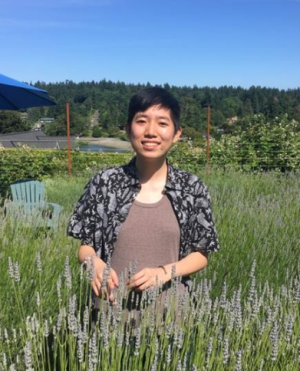Q&A with Susan Hou, Community Partner Fellow
Susan Hou is a data scientist at the University of Washington conducting quantitative education research for Washington STEM. We are thrilled to have Susan Hou join our team as a Community Partner Fellow. Read on to learn about what inspires Susan, what they love most about Washington, and their path to becoming an educational researcher.
Q. Why did you decide to join Washington STEM?
 I am joining Washington STEM as a Community Partner Fellow and doctoral student in the University of Washington’s College of Education, where I’m really lucky to have a supportive community that deeply values social justice and creating change. While I hope to enact these values with WA STEM, I’m also eager to understand the connections between STEM, upward mobility, and racial justice in Washington and how related pieces of data could inform policy.
I am joining Washington STEM as a Community Partner Fellow and doctoral student in the University of Washington’s College of Education, where I’m really lucky to have a supportive community that deeply values social justice and creating change. While I hope to enact these values with WA STEM, I’m also eager to understand the connections between STEM, upward mobility, and racial justice in Washington and how related pieces of data could inform policy.
Q. What do equity in STEM education and career mean to you?
Equity in STEM education and career means a future where there is reciprocity and agency for different communities to both learn from and shape STEM fields. At the very basic, I think it’s important for people who want to pursue STEM careers to have a comprehensive understanding of the field, the field’s history, and the resources available to them. I also think these people must receive compensation that aptly covers their needs and their community’s needs. But beyond that, I believe that there should be humility and reciprocity in STEM fields to defer to community knowledge and become shaped by the community.
Q. Why did you choose your career?
I chose to be an educational researcher so I could learn more about power and society. In many ways, I am still locating myself in our world of social movements and change. My research focuses on race, anti-racism, and related social movements in the US and in Taiwan 臺灣. I’ve always enjoyed thinking about theories and daydreaming about where we could be. Grounding that in practice is something that I am still learning to do. My current position as an educational researcher helps me with that, encouraging me to explore the possibilities out there for material changes and guiding me towards simultaneously brave and kind people.
Q. Can you tell us more about your education/career path?
Of course! Well, my path so far has been winding and guided by the weights of different stories.
To sum up, my educational background includes K-12 in Taiwan 臺灣 and higher education in the US. While in Taiwan, I had the chance to meet classmates and teachers from various bubbles of society. I spent half of my time in public schools and half in private, including three years at a Catholic school. (It was there that I realized that nuns can still lose their temper and turn beet red, especially around a group of strong-willed 11-year-olds!) During my time in Taiwan, most of the education system was tracked and, even as children, I think my classmates and I felt the obvious pressure to “succeed.” The ramifications were devastating in terms of family relations, mental and emotional health, and general quality of life. There were pressures from other sources too. I became somewhat familiar with stories about poverty (the kind that threatens every meal), racism, son preference, ableism, homophobia, and other axes of oppression.
For a while, I envisioned medicine as my way of contributing to healthy and justice-oriented change, so I completed an undergraduate degree in bioengineering. While continuing to absorb different yet somehow familiar stories in the US, somewhere in that journey I then learned about how impactful policy and legislation are to the practice of medicine and, by extension, to impacted communities. After a brief internship in science policy at a nonprofit federation in DC, I decided to make some changes to my own life and I’m now embarking on a new journey as an educational researcher at UW!
Q. What inspires you?
In general, beings who make things happen while leveraging humor and joy inspire me. There are people in my day-to-day life, my neighborhood, in books, and in other forms of media who inspire me by being confident and secure in showing kindness and care. Also, my cat teaches me about this too as they greet every being with curiosity and friendliness, even when the world can seem so strange to them!
Q. What are some of your favorite things about Washington state?
The forests! Ever since I can remember, I’ve spent almost every weekend hiking in Taiwan’s forested mountains. Now, there’s something so familiar and safe about wandering between ferns and trees, so I’m glad and grateful that Washington’s nature scene resembles the forests in Taiwan.
Q. What’s one thing about you people can’t find through the internet?
That I used to have blue hair! I rarely post any photos of myself online and never did during my blue/green-haired years. But if we meet and you’re curious about it, I’d happily dig up a photo or two.